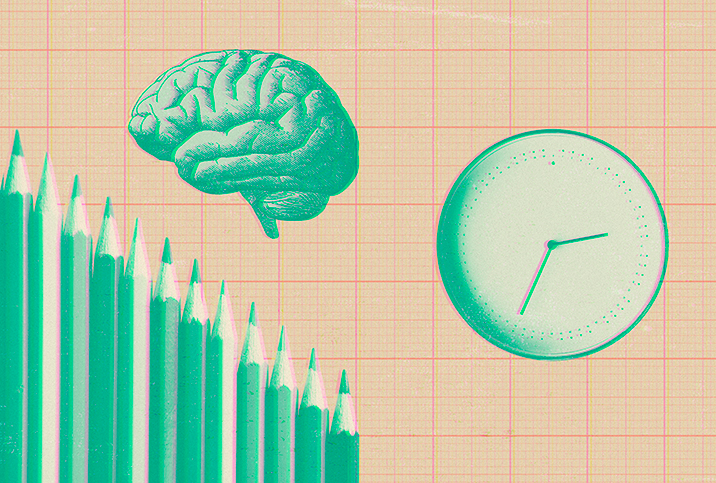The Symptoms of ADHD Can Be Misunderstood

Many people consider ADHD a relatively new phenomenon, but the first mention of symptoms consistent with the condition was recorded in 1798 by a Scottish doctor, Sir Alexander Crichton.
Everything changed in 1944 when methylphenidate was synthesized and later marketed under the brand name Ritalin to treat the disorder. Although the terms attention-deficit disorder (ADD) and attention-deficit/hyperactivity disorder (ADHD) became popular in the 1960s, it was not until the 1980s that the terms became medically established.
Many people associate this condition with young boys bouncing off the walls, unable to sit still or pay attention. And while this description can be true, the image breeds misconceptions that the disorder primarily affects boys, makes people hyper and, ultimately, renders them unable to focus at all.
In fact, the disorder can affect all types of people at all ages. Adult ADHD can affect relationships, work, daily activities and social life.;
There are also implications for our sexual health. Since ADHD can make you feel anger and loneliness—as well as anxiety, depression and emotional instability—it can drain your interest in sex and make it difficult for you to enjoy intimate relationships. For instance, you may zone out in conversations, forget important details or agree to details you later don't remember.
Research published in 2018 indicated 43 percent of women with ADHD and 39 percent of men with ADHD had issues with sexual function.
However, it is hard to gauge the effects of ADHD on sexual health because symptoms can be very different for each person. For example, ADHD can lead to hypersexuality—excessive and compulsive sexual behavior—or hyposexuality, the complete opposite.
What is ADHD?
John Kruse, M.D., Ph.D., of San Francisco, is a psychiatrist and neuroscientist with expertise in ADHD. His book, "Recognizing Adult ADHD: What Donald Trump Can Teach Us About Attention Deficit Hyperactivity Disorder," is a fascinating look at how the condition follows people into adulthood, using the former president as an interesting case study.
"Many confuse ADHD symptoms and think most people with ADHD lack motivation, focus and willpower," Kruse explained. "However, ADHD is more a problem with executive functioning rather than simply being a distractible person who chooses not to pay attention."
According to a 2014 review, executive functions fall into three main categories:
- Inhibitory control is useful when we need to hold back or control impulses to make decisions or get things done.
- Working memory is when we need to hold certain information in our minds to plan or execute an action.
- Cognitive flexibility refers to our ability to think outside the box. This flexibility is helpful when we need to change our ideas or perspective or acquire new information.
All of these functions can be affected in people with ADHD, although not everyone is similarly affected.
Kruse noted the executive functions most affected by ADHD include directing, maintaining and switching attention, inhibiting responses, regulating emotions, utilizing short-term memory, managing time, organizing and planning. Most importantly, he called attention to new research that suggests an interest-driven nervous system is the hallmark of ADHD.
"Individuals with ADHD know that they have to pay their taxes on time or file their expense reports to be reimbursed or complete their work assignment to keep their boss happy," he said. "But if a compelling news video pops up or they find a cherished item of clothing or they get a brilliant idea for a song lyric, they may jettison everything else to pursue this new fascination. Unless the tasks are interesting, they will likely remain neglected."
Unfortunately, people with ADHD are often mistaken for lazy people who don't understand how to get essential tasks done. But people with ADHD can do extraordinary things as long as their tasks are—by their own definition—interesting.
Their executive functions don't click in without interest, and their nervous system doesn't react the same way as it does in people without ADHD.
ADHD vs. ADD
Kruse declared ADHD and ADD to be the same disorder, although there has been an ongoing myth that some people with ADHD lack the hyperactivity component. This may appear to be true for adults who have learned how to change their behaviors to "fit" into a society that doesn't reward hyperactive behaviors.
Although some subtypes favor inattentive symptoms rather than hyperactivity, Kruse explained most people with ADHD show signs of hyperactivity, even if they're not obvious.
"I have seen a large percentage of individuals who loudly state that they have ADD and not ADHD, but they show lots of the rapid talk, constant gesturing, fidgeting and pacing," he said.
These signs are often the adult manifestation of hyperactivity.
Kruse pointed out that one of the enigmas of ADHD is if you have trouble paying attention, you are likely to miss how often you're not paying attention.
ADHD in adults
The myth that you can outgrow ADHD in adulthood is largely unfounded. New evidence published in September 2021 indicated most adults exhibited signs of ADHD in childhood and continue to have the condition throughout adulthood.
Kruse said he has seen much evidence in his practice of ADHD persisting through adulthood, and most of the time, adults learn to compensate or live with the symptoms. However, many adults who don't know they have ADHD experience considerable struggles in their adult lives.
Interestingly, hyperactive symptoms are the most likely to evolve or improve in adulthood. But this is usually because adults have learned how to temper certain hyperactive behaviors to blend into their social and work environments.
"Many adults with ADHD are prone to racing thoughts, rapid speech, fidgeting, pacing or impulsivity," Kruse said.
Many adult ADHD symptoms can be discovered through relational issues, because our friends and significant others are more apt to notice inattentiveness before the person with ADHD does.
Just the facts, ma'am
There are as many as 3 million new cases of ADHD diagnosed every year in the United States. With new research being carried out, there are many interesting facts that should help to dissuade people from getting their information from less credible online sources.
These details include:
- ADHD is known to overlap with other psychiatric disorders and PTSD.
- ADHD may have many different genetic factors that increase the risk for the disorder.
- Conditions such as allergies, asthma, epilepsy, sleep disorders, celiac disease and diabetes are often correlated with ADHD.
- People with ADHD have an increased risk of substance abuse, mental health disorders, injuries and accidents, educational underachievement and crime.
- People with ADHD have higher incidences of sexually transmitted diseases, assault and poor sexual decision-making.
- Studies indicate that environmental toxins, such as lead, smoking, food dyes, certain medicines, preservatives and fertilizers, can increase the risk for ADHD. Also, maternal exposure to toxins and prenatal and maternal issues such as prematurity, vitamin deficiencies, preeclampsia or high blood pressure, obesity and hypothyroidism may increase risk, too.
There are definitely challenges to having ADHD in your adult years, but many people with ADHD experience personal success and healthy relationships.
People with ADHD can assign all their energy and intellect to their interests because it is such an interest-driven condition. People who find careers and relationships that adequately fit into their interests often become very successful due to their hyperfocus.
Also, as adults with ADHD have to work so much harder to get things done, they are often creative, resilient, funny and dynamic.


















